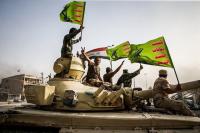-
U.S. nuclear weapons in Turkey at risk of seizure by terrorists, hostile forces
The continued presence of dozens of U.S. B61 nuclear weapons at Incirlik Air Base in Turkey raises serious risks of their seizure by terrorists and other hostile forces, a new report says. These weapons no longer serve any military purpose, and ending B61 presence in Europe would save $3.7 billion over five years.
-
-
U.S. social media strategy can use Twitter more effectively to weaken ISIS influence

Opponents of ISIS and Syria are six times greater in number on Twitter than ISIS supporters, but those sympathetic to the group are more active on the social media platform, according to a new RAND Corporation study. The researchers, analyzing more than twenty-three million tweets posted in Arabic over a 10-month period, found that, on average, supporters of ISIS produce 50 percent more tweets than opponents on a typical day, although there is evidence that ISIS opponents are increasing their activity.
-
-
The political role of drone strikes in U.S. grand strategy

Years of debate on the issue of U.S. drone strikes show that many Americans have reservations. People are concerned that drone strikes devalue non-American lives, dangerously expand executive power, and drive terrorism and anti-Americanism. The concerns Americans have about these kinds of drone attacks – apparently unilateral, apparently violating the norm of state sovereignty, and conducted without a formal justice process — reflect well on a public wondering what the U.S. role in the world should be. But assessing the value of drone strikes requires looking beyond the attacks themselves to first identify and prioritize U.S. interests and threats. Only in that context is it possible to decide whether one supports or opposes drone strikes for what they may gain the United States politically.
-
-
Managing terrorism risk more complicated today
Managing terrorism risk today requires a combination of strategies and tactics that protect people, property, and finances. On the financial side, the choice is whether to retain or transfer the risk via insurance. But the changing pattern of terrorism risk has some companies questioning whether they are adequately insured for business interruption and related losses. And they wonder how to prepare for potential losses from cyber terrorism and other events.
-
-
CENTCOM’s assessment of U.S. anti-ISIS efforts too rosy: Congressional panel
A congressional joint task force (JTF) investigating allegations of intelligence manipulation at U.S. Central Command (CENTCOM) last week released an initial report detailing persistent problems in 2014 and 2015 with CENTCOM analysis of U.S. efforts to train the Iraqi Security Forces and combat ISIS in Iraq and Syria. The JTF found that intelligence products approved by senior CENTCOM leaders typically provided a more positive depiction of U.S. antiterrorism efforts than was warranted by facts on the ground and were consistently more positive than analysis produced by other elements of the intelligence community.
-
-
The rise of a cyberterror community is on the horizon
A social psychologist who is also a cybersecurity experts says that the rise of a cyber terror community is on the horizon. The researcher believes that this new community may be the logical next step in the development of our digital world. “The magnitude of potential damage for a cyberattack is remarkable, and the number of targets for a cyber terrorist attack is amazingly large,” he said. “The chance of getting caught are very small, and some of the resources to complete the crime are very easy to obtain — not to mention the potential for getting away with it is very high.”
-
-
North African Islamist terrorists dig up Nazi mines for use in IEDs
ISIS and its affiliate organization in North Africa have found a new source for munition materials: Digging up old landmines from the Second World War and using them to fashion IEDs for terrorist attacks. The retreating German forces under the command of Field Marshal Erwin Rommel buried about seventeen million landmines under the surface in western Egypt and north-east Libya.
-
-
Hundreds of U.K. teenagers still want to fight in ISIS ranks in Syria
Kadiza Sultana, a 17-year old Briton who traveled to Syria in February 2015 to join ISIS, was killed two weeks ago by a Russian airstrike on Raqqa, the informal capital of ISIS. Still, experts say that hundreds of British teenage girls are keen on joining ISIS. This reality has raised questions about the effectiveness of the British government’s approach to counter-radicalism.
-
-
Reducing terrorist recruitment by countering terrorist narratives
Recruiters for violent extremist groups, just like screenwriters and marketers, use storytelling techniques to craft their messages. Analyzing those narratives and producing counter-narratives may be one way to cut the success of terrorist recruitment, according to researchers. “No matter what the context is — whether it’s terrorism or health communication or organizational communication — the principles of persuasion all operate the same,” say a researcher.
-
-
ISIS ranks in Syria, Iraq “decimated,” with only 15,000 fighters left: U.S. commander

The number of ISIS fighters in Iraq and Syria has been substantially reduced by an effective U.S.-led military campaigns, leaving as few as 15,000 militants to fight, a senior U.S. commander said. Not only has the estimated number of ISIS fighters shrunk from earlier estimates of between 19,000 and 25,000, but the U.S. commander said that the quality of ISIS fighters has decreased. “The enemy is in retreat on all fronts,” Lieutenant General Sean MacFarland said.
-
-
Patterns of ISIS-related terrorism, 2002-2015
Between 2002 and 2015, more than 4,900 terrorist attacks were carried out by groups or organizations affiliated with ISIS. These attacks caused more than 33,000 deaths and 41,000 injuries. These attacks represented 13 percent of all terrorist attacks worldwide and, 26 percent of all deaths, and 28 percent of all injuries due to terrorism during the same time period.
-
-
Germany to search refugees' phones to establish identity, spot suspicious connections

German interior minister Thomas de Maizière will next week announce a new German anti-terror steps, which, among other things, will require refugees and asylum-seekers arriving in Germany without a passport to surrender their smartphones – and all the passwords and security pin numbers associated with the phones – so German security agencies could check the owners’ social media accounts. The security services in Denmark, Norway, Sweden, and the Netherlands already routinely examine refugees’ mobile phones to establish a refugee’s identity.
-
-
Food crisis in northeast Nigeria drives youth to radicalize, join Boko Haram: UN
Urgent action is needed to provide farming and livelihood support to 385,000 people in parts of Nigeria’s northeast where food insecurity is rampant, the UN Food and Agriculture Organization (FAO) said. The UN agency noted that more than three million people are affected by acute food insecurity in Borno, Yobe, and Adamawa States. Failure to rebuild the rural economy will translate into lack of employment opportunities with possible harmful consequences including youth radicalization and enrolment into armed groups, resulting in continued civil unrest.
-
-
French girl, 16, to face charges for plotting a terrorist attack
A judge in France has agreed with the prosecution that a 16-year-old French girl should face preliminary terrorism charges for supporting ISIS and trying to plot a terrorist attack. The Paris prosecutor’s office said on Monday that the girl was using an encrypted social media app to spread calls by ISIS to the organization’s followers in France to commit violent acts.
-
-
Swedish charismatic church to drop Bibles from drones over ISIS-controlled areas in Iraq
A Sweden-based evangelical church has announced it would airdrop thousands of copies of the Bible onto areas of Iraq controlled by the Islamist ISIS. The church said it was part of an effort to “pass the hope and love of the Christian gospel” to people living under ISIS control. The church said the air drops were not a provocation, but was rather motivated by “unfailing and never-ending love” for all people.
-
- All
- Regional
- Water
- Biometrics
- Borders/Immig
- Business
- Cybersecurity
- Detection
- Disasters
- Government
- Infrastructure
- International
- Public health
- Public Safety
- Communication interoperabillity
- Emergency services
- Emergency medical services
- Fire
- First response
- IEDs
- Law Enforcement
- Law Enforcement Technology
- Military technology
- Nonlethal weapons
- Nuclear weapons
- Personal protection equipment
- Police
- Notification /alert systems
- Situational awareness
- Weapons systems
- Sci-Tech
- Sector Reports
- Surveillance
- Transportation
Advertising & Marketing: advertise@newswirepubs.com
Editorial: editor@newswirepubs.com
General: info@newswirepubs.com
2010-2011 © News Wire Publications, LLC News Wire Publications, LLC
220 Old Country Road | Suite 200 | Mineola | New York | 11501
Permissions and Policies
Editorial: editor@newswirepubs.com
General: info@newswirepubs.com
2010-2011 © News Wire Publications, LLC News Wire Publications, LLC
220 Old Country Road | Suite 200 | Mineola | New York | 11501
Permissions and Policies
